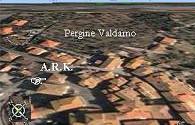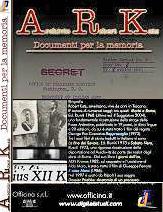 An
American writer's long, hard look at the Italy of his times turns to gaze
the future
An
American writer's long, hard look at the Italy of his times turns to gaze
the future
Millions
of words, images by the tens of thousands, the gigabytes of history in-the-making
(and dreams yet undreamt), the content of Robert Katz's "ark" settles
in under a Tuscan sky
Recently
donated by the author to the small hilltop township
where
he resides, the
archive has already received the state's
highest designation: "archive
of notable interest"
 ERGINE
VALDARNO (from combined dispatches) — Robert Katz,
the American historian who became famous in Italy
with the publication of his book Death
in Rome, the fundamental reconstruction of the
Ardeatine Caves massacre, has decided to donate his
archives to the town of Pergine Valdarno. An official
report to the Tuscan regional government's directorate
of cultural affairs, concluded that Katz's choice represents
an "unquestionable enrichment of the documentary holdings
both for Tuscany and nationally." The report went on
to describe the contents of the archive, noting that
it included a library of about 1,000 rare books. According
to this assessment of the archive, another feature setting
it apart from standard items – in this case nearly 100,000
pages of correspondence, diaries, and written and audio-visual
documents – consists of a vast array of material collected
by the author during his ten-year court battle in Rome
with the Vatican. "It contains a wealth of information
about many well-known personalities," the report states.
They range from several historical figures to international
titans of the film world – an
extension of the author's unique documentation of the
Americans in Rome throughout the 1970s. ERGINE
VALDARNO (from combined dispatches) — Robert Katz,
the American historian who became famous in Italy
with the publication of his book Death
in Rome, the fundamental reconstruction of the
Ardeatine Caves massacre, has decided to donate his
archives to the town of Pergine Valdarno. An official
report to the Tuscan regional government's directorate
of cultural affairs, concluded that Katz's choice represents
an "unquestionable enrichment of the documentary holdings
both for Tuscany and nationally." The report went on
to describe the contents of the archive, noting that
it included a library of about 1,000 rare books. According
to this assessment of the archive, another feature setting
it apart from standard items – in this case nearly 100,000
pages of correspondence, diaries, and written and audio-visual
documents – consists of a vast array of material collected
by the author during his ten-year court battle in Rome
with the Vatican. "It contains a wealth of information
about many well-known personalities," the report states.
They range from several historical figures to international
titans of the film world – an
extension of the author's unique documentation of the
Americans in Rome throughout the 1970s.

The Tuscan town of Pergine Valdarno (pop. 3200) as seen in a satellite
photo .High above the Arno river valley, some 60 kms. soufh of
Florence, Pergine originated as an Etruscan settlement. In the
2700 years since, it has seen much, "which is why I chose
it, "says Katz." They didn't quite say If you build it
they will come, but that was the message of their millenary history.
You come, you see, you're conquered."
|
Robert
Katz first
came to Rome in 1964. "I was following a
grand old tradition," he says. "It hadbeen created
by some of the great American writers and artists
of the 19th
century, and like them,
I'd set out to pursue and court the 'mistress of the
world.' The phrase was coined by Washington Irving
when he went to Rome in 1805, one of the first...
I asked
myself, would that mistress be as kind to me?"
In a recent interview on how his archives evolved, the
author recalled that within a single month of his
arrival, his quest for Rome's favors was rewarded. "I
came across the story that, when written, would change
my life forever and in a way that few men dare to dream
for very long, my work altered the course of some of
the significant events of my times."  The
life-changing story, a meticulous reconstruction of
the Ardeatine Caves massacre entitled Death in
Rome,
would be published in 1967, a n acclaimed international
best-seller
that would appear in some 25 editions worldwide and
remain in print to this day. Over those forty
years, living in Rome and later Tuscany, Katz wrote
several nonfiction books, essays, novels and screenplays,
almost
always about 20th-century Italy. "But," he says, "the
formation of this archive, like my life and work as
an American abroad,derives from Death
in Rome. the watershed that brought me to sll
my studies of things Italian, transforming me - in
the
1970s - from a
student of the past into a direct observer and at times
even a protagonist - of a cataclysmic present. The
life-changing story, a meticulous reconstruction of
the Ardeatine Caves massacre entitled Death in
Rome,
would be published in 1967, a n acclaimed international
best-seller
that would appear in some 25 editions worldwide and
remain in print to this day. Over those forty
years, living in Rome and later Tuscany, Katz wrote
several nonfiction books, essays, novels and screenplays,
almost
always about 20th-century Italy. "But," he says, "the
formation of this archive, like my life and work as
an American abroad,derives from Death
in Rome. the watershed that brought me to sll
my studies of things Italian, transforming me - in
the
1970s - from a
student of the past into a direct observer and at times
even a protagonist - of a cataclysmic present.
The author's
reflections on the A.R.K. are part of a 20-minute documentary
film, soon to be
distributed on
DVD. The film, drawn entirely from material contained
in he archive, is a dramatic rendering of Katz's
nearly-half-century sojourn in Rome and Tuscany. It
is narrated by Linda Giuva, an archivist of international
renown and presently professor of archival
science at the University
of Siena. Giuva, a former "first lady" of Italy (as
the consort of ex-Prime Minister
Massimo D'Alema, will direct the A.R.K project.Her vision
of the archive is layered and wide-ranging. "Like all
private papers," she notes, "Robert Katz’s archives tell
the story of their author’s
life, his works and the people around him, some of them
dearer than others. It is an album of memories, as he
himself  calls
it, but in this case, they pertain not only to him, but
to all Italians. They speak to us about some
of the most important events in our recent history." As
an example, she cites the film based on Death in Rome,
which brought on a courtroom
battle in Rome lasting almost ten years. "This trial and
its repercussions," says Giuva, "were one of the most important
episodes in the author’s life and in the cultural life
of this country." It had global impact as well, she says,
going on to describe the international side of A.R.K. "Katz's
relationships with people throughout the world, particularly
in America, is richly documented in his correspondence,
his diaries, and his published writings. Perhaps more important
is the viewpoint of a non–Italian observer, an American,
recording the events of our recent past. As a result, he
helps us understand how these events may have been interpreted
by nations whose cultures differ from ours." Noting yet
another feature of the archive – less apparent but no less
important – is the documentation revealing Katz's intimate
knowledge of the American community living in Italy, and
particularly the life of the Americans in Rome from the
mid-60s onward. "Later, some of those Americans settled
in Tuscany and in neighboring areas and thanks to Robert
Katz’s
records, we can reconstruct the relationships, motives and choices of a notable
episode for this part of our country." calls
it, but in this case, they pertain not only to him, but
to all Italians. They speak to us about some
of the most important events in our recent history." As
an example, she cites the film based on Death in Rome,
which brought on a courtroom
battle in Rome lasting almost ten years. "This trial and
its repercussions," says Giuva, "were one of the most important
episodes in the author’s life and in the cultural life
of this country." It had global impact as well, she says,
going on to describe the international side of A.R.K. "Katz's
relationships with people throughout the world, particularly
in America, is richly documented in his correspondence,
his diaries, and his published writings. Perhaps more important
is the viewpoint of a non–Italian observer, an American,
recording the events of our recent past. As a result, he
helps us understand how these events may have been interpreted
by nations whose cultures differ from ours." Noting yet
another feature of the archive – less apparent but no less
important – is the documentation revealing Katz's intimate
knowledge of the American community living in Italy, and
particularly the life of the Americans in Rome from the
mid-60s onward. "Later, some of those Americans settled
in Tuscany and in neighboring areas and thanks to Robert
Katz’s
records, we can reconstruct the relationships, motives and choices of a notable
episode for this part of our country."
|

